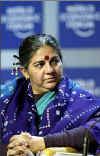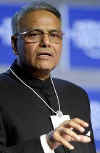|
|
||||
|
Role of
Internet In South Asian Development Technology
- a weapon to
Viewpoint Sundown Madness at Wagah Border
Heritage & Travel
Books
|
|
|
||
|
the-south-asian.com February 2001 |
||||
|
Page 2 of 4
South Asians on the issue of Globalisation
The protests and demonstrations at the WTO Conference in Seattle last year brought the issue of globalisation to the forefront. Until recently globalisation did not mean economic opportunities for the developing countries. A lot of rethinking has gone in towards the redefinition of the term globalisation. "The future success of globalisation requires that developing countries be fully involved in the management of the global economy and that their voices be heard." However, globalisation is not just an economic concern - it is also about the survival of traditional societies and their culture in the face of strong cultural indoctrination. Among the South Asians who spoke on global issues and technology were Azim H. Premji, Fareed Zakaria, N. Chandrababu Naidu, Vandana Shiva, Yashwant Sinha, Masood Jabbar, M. Sawhney, Raj Reddy and Rajat Gupta - to name a few. Indigenous knowledge & intellectual property
(PhD in Physics, Univ. of Western Ontario;
Author: Monocultures of the Mind; The Violence of Green Revolution.
Expertise: globalisation, genetic engineering, gender issues, biodiversity,
ecology, agriculture, biotechnology, IPRs. Recipient of honours and awards.) How can Globalisation deliver the Goods: The view from the South " ... it is the West’s affluent lifestyles that pose the greatest threat to the environment." - Yashwant Sinha
Sinha also condemned immigration policies that rob developing nations of the best and brightest. Citing statistics from a German magazine, he noted that 38% of all US doctors and 12% of its scientists are Indian. Indians also comprise a significant portion of the workforce at such companies as Microsoft, International Business Machines and Intel, he said.
"If the entire world were to adopt the lifestyle of the
suburban American, then there would be no world to live in." -- Yashwant
Sinha, Minister for Finance of India
The Challenges of National Economic Policy in a Global Era How can governments design national policies at a time of globalisation? Second, how can governments achieve broad policy co-ordination on a global scale? Here the role of international financial institutions such as the WTO, World Bank and the IMF comes into play. Finally, how can national governments be sure of striking the right balance? Yashwant Sinha, Minister of Finance of India, cited one example of the inequities in the international system. Starting from 1 April, he said, India is lifting all quantitative restrictions on trade under guidelines from the World Trade Organisation. However, rich nations will only abolish quotas on textile imports from developing nations in 2005. "Under international arrangements, nations surrender part of their sovereignty to build a global community. However, if this process is inequitable, it creates problems for the less developed nations," Sinha cautioned.
|
||||
| Copyright © 2000 [the-south-asian.com]. Intellectual Property. All rights reserved. | ||||
| Home |

